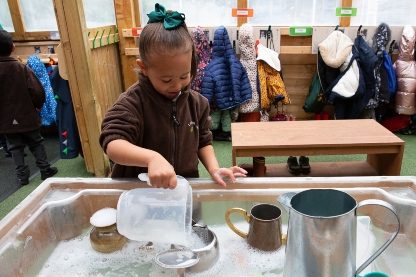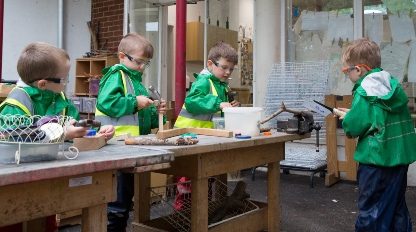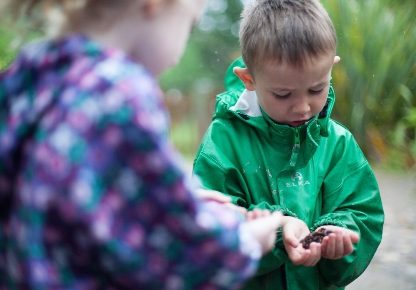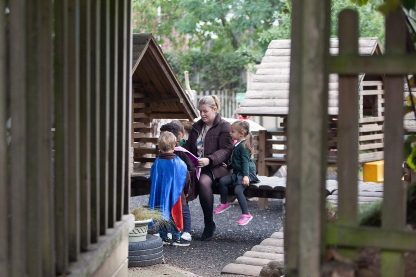As many young children across the UK prepare for transition from nursery to school, educator Rachel Griffiths makes the case for more primary school teachers to incorporate Froebelian principles into their practice.
Froebelian principles and primary education
Froebelian practice is at present most closely associated with the care and education of very young children. The term may conjure images of kind, knowledgeable practitioners supporting children in their play; of children exploring their unique ideas, identities, and interests. Or it may conjure Froebel himself, pockets stuffed with collected curiosities, leading his charges out on an adventure into the countryside.
These images reflect the range of principles so deeply embedded in the work of the Froebel Trust and Froebelian practitioners working in the early years:
- the value of childhood
- the centrality of relationships
- the necessity of supporting autonomy and creativity
- the importance of play and nature
- the overarching connectedness of children’s experiences.
Once children begin school, however, these principles can become more elusive.
Time for play becomes constrained, hemmed in by phonics, numeracy, and assessments. Children learn to “sit nicely” — their wriggly, surprising bodies now an inconvenience and a barrier to “good listening” rather than a source of curiosity and a tool to explore their world. It can be difficult to see how autonomy and creativity, even childhood itself, is valued in a classroom if all are expected to always conform to an adult agenda of teaching and learning.
Images of the natural world are woven throughout Froebel’s writing on childhood. Just as every flower germinates, grows, and matures in its own time and in its own particular way, every child’s path through life is different.
Children learn in different ways, at different speeds, and through interests in different areas. Of course we want our children to finish primary school with the ability to read, write and work with number. But we also want them to see these activities as meaningful parts of their lives; tools to be used in the service of self-expression, communication, and creativity. Incorporating Froebelian principles into our educational practice can move us further in the direction of making this a reality for every child.
...Froebelian practice is a set of principles rather than a prescribed approach - and these can be used as a guide, whatever the challenges...

The practicalities of putting such principles into practice can feel challenging for many primary teachers. We are often working within the constraints of limited time, resources, and support as well as sometimes overwhelmingly large class sizes. However, Froebelian practice is a set of principles rather than a prescribed approach — and these can be used as a guide, whatever the challenges.
In my own practice as an early-career teacher I struggled with the conflict between what seemed to be expected of me and what my instincts told me the children needed. Detailed and inflexible forward plans didn’t fit with my certainty that children need to have autonomy and choice over their learning, and seating thirty small children at tables all day didn’t seem right either. I wasn’t sure I liked teaching after all, if this is what it had to look like. But what discovering Froebelian practice gave me was the confidence to stand by my instincts and convictions, and the language with which to talk about them.
Froebelian play and autonomy
In the spring of 2022 I took over a Primary Four class (ages 7 and 8), in the midst of completing my Froebel Certificate at University of Edinburgh and with the support of my headteacher I decided to dedicate one to two afternoons a week to time spent in the school garden.
Nature provides a rich environment in which children can explore and develop their play, with minimal need for additional resources. Though I had a few suggestions for the children, I was clear that this was their time to use as they pleased. Some children planted flowers; some climbed and ran; some spent every available minute digging and transporting water to make mud. My role was not to dictate their activities, but to stand back and observe. I supported and extended learning where I could, and recorded what was happening through photos, videos and written observations and reflections.
Froebel teaches us that children need uninterrupted stretches of time to engage deeply in their play and creative endeavours...

Froebel teaches us that children need uninterrupted stretches of time to engage deeply in their play and creative endeavours, and for me the choice to spend entire afternoons in the garden was key. With no need to constantly stop and tidy up and do other things, the children luxuriated in their newly available time and several talked about how much they liked being able to rest, as well as play and work. For me this felt like an important way to incorporate the Froebelian principles of unity and connectedness and the value of childhood - with the freedom of time and space I was able to see the children as complete humans, not just as school pupils with learning objectives and standards to meet.

As the weeks passed I felt increasingly at home in my practice in the school garden. I trusted the children to know what they needed and trusted myself to be able to support them. I also began to trust that the children truly were learning, and though I was not planning activities in advance or setting out learning intentions, I was able to map their learning to the curriculum and show where individuals were making progress. In seeking out ways to embed Froebelian principles into my daily practice I felt I was moving towards a more meaningful school experience for both the children and myself.
Looking forwards
Keeping Froebelian principles at the forefront of educational practice requires persistence and a great deal of reflection.
This year I have a large Primary Two class (ages 5 and 6) with a wide range of needs and limited adult support. I am still thinking about how best I can honour the childhood of all these children. But with the Froebelian principles as my guide, I have a benchmark for every decision I make, and the confidence and language with which to explore the daily questions and quandaries of the difficult, frustrating, and always wonderful job of working with children in the primary classroom.
_
Rachel Griffiths
About the author
Rachel Griffiths is a primary school teacher based in Edinburgh, Scotland. She has worked as a class teacher with all ages - including as an Early Years Practitioner in a nursery school. She has completed the Froebel in Childhood Practice Course at University of Edinburgh.
Rachel created this short article during the Froebel Trust's Writing Workshop held in Summer 2022.
The power of play
An article by Alison Hawkins, headteacher at an inner city kindergarten, considers why we need more play in our primary schools.
Find out more

